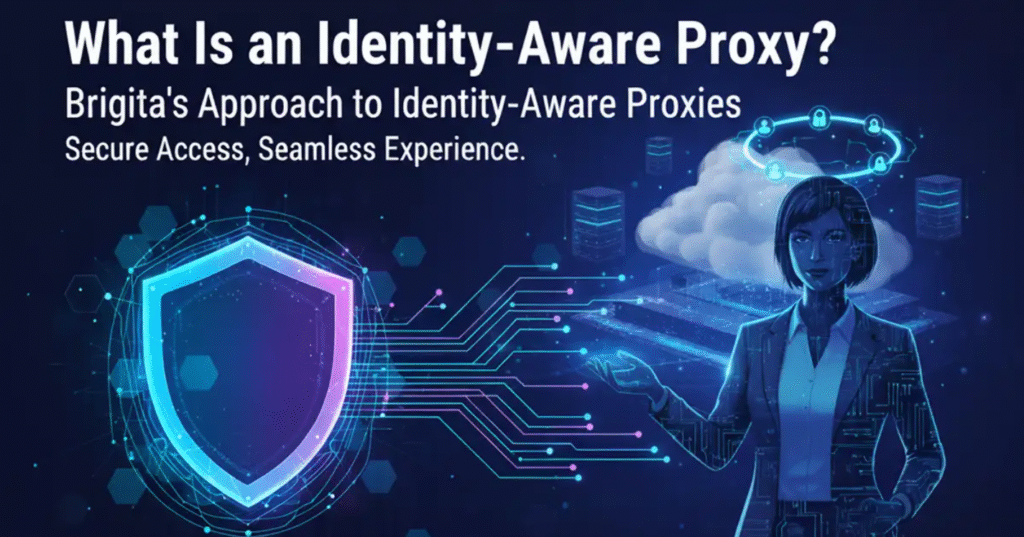With remote work, hybrid cloud adoption, and distributed applications becoming the norm, traditional network security measures like firewalls and VPNs are no longer sufficient. Hackers are becoming more sophisticated, and enterprise data is increasingly exposed across multiple platforms. This is why Zero Trust Security has become essential—it operates on the principle of “never trust, always verify.” At the heart of this approach are Identity-Aware Proxies (IAPs), which act as intelligent gatekeepers for cloud-native applications, ensuring that only authorized users gain access while reducing risk across complex digital environments.
According to Gartner, organizations that implement IAPs can reduce unauthorized access incidents by up to 35%, showing how critical this technology has become for enterprises worldwide.

What Is an Identity-Aware Proxy?
An Identity-Aware Proxy is a security layer that sits between users and applications, checking who is accessing resources and whether their devices meet security requirements. Unlike older solutions that rely on IP addresses or network locations, IAPs focus on identity, device posture, and contextual risk signals to grant or deny access. This ensures that even if a user is inside the network, their actions are continuously verified for security.
IAPs include features such as Single Sign-On (SSO) and Multi-Factor Authentication (MFA) for secure and simple logins. They also enforce role- and attribute-based access control, continuously monitor sessions for suspicious activity, and integrate seamlessly with cloud-native applications, APIs, and microservices. By centering security around the user identity rather than network location, IAPs reduce attack surfaces and support the principles of Zero Trust Architecture.
Why Identity-Aware Proxies Are Essential for Zero Trust Security
Zero Trust Security relies on the idea that no user or device should be trusted by default. Traditional network defenses assume that once a user is inside the network, they are safe, leaving organizations vulnerable to insider threats, compromised accounts, and cloud-based attacks. Identity-Aware Proxies strengthen Zero Trust by verifying every request against the user’s identity and the device’s security posture.
IAPs enable adaptive risk policies, taking into account factors such as device compliance, geolocation, login time, and behavioral patterns. They enforce least privilege access, giving users only the permissions necessary for their roles, and prevent attackers from moving freely within the network if credentials are compromised. By implementing IAPs, enterprises can create a resilient security environment that protects critical assets while minimizing operational friction.
IAPs in Cloud-Native Security
Modern applications are often distributed across multiple platforms like AWS, Azure, Google Cloud, or hybrid environments. Traditional access models struggle to secure these dynamic and decentralized systems, leading to inconsistencies and higher security risks. Identity-Aware Proxies solve these challenges by providing unified access control across hybrid and multi-cloud setups, ensuring consistent protection across all platforms.
IAPs also allow secure access without relying on legacy VPNs, helping organizations reduce operational overhead while maintaining compliance with standards such as ISO 27001, GDPR, and NIST 800-207. They integrate with APIs, microservices, and DevOps pipelines, allowing security to scale with modern workloads. For enterprises, IAPs provide both efficiency and reliability, ensuring cloud-native security deployments are robust and manageable.
Cloud Access Control Reinvented
Modern enterprises require context-aware, dynamic access decisions rather than simple allow-or-deny rules. Identity-Aware Proxies enable granular control based on real-time risk signals. Organizations can restrict access to sensitive applications to compliant devices, block logins from unusual locations or times, enforce MFA for high-risk actions, and log every transaction for audits and compliance reporting.
This proactive approach allows security policies to evolve with the organization, providing stronger protection than static firewall rules. By continuously monitoring and adapting to user behavior and device status, IAPs create a secure environment that supports both productivity and safety.
Benefits of Identity-Aware Proxies for Enterprises
Identity-Aware Proxies deliver multiple benefits for modern enterprises. They improve the security posture by reducing unauthorized access and minimizing the risk of data breaches. IAPs simplify the user experience through SSO and MFA, making secure login seamless. They are highly scalable, supporting distributed teams and dynamic cloud workloads without complex VPN infrastructures.
Additionally, IAPs provide centralized visibility and compliance through dashboards for monitoring, reporting, and auditing. This combination of enhanced security, operational efficiency, and usability ensures that enterprises can protect sensitive resources while enabling employees to work without unnecessary friction.
Best Practices for IAP Deployment
To implement Identity-Aware Proxies effectively, enterprises should follow a few best practices. Start by prioritizing high-value assets such as applications containing sensitive or regulated data. Enforce MFA across all users to strengthen identity verification. Use role-based and attribute-based access controls to ensure users only access what is necessary for their responsibilities.
Continuous monitoring is critical—analytics and logging should detect suspicious activity early. Educating users about security awareness, phishing prevention, and safe credential practices is equally important, as human error remains a top cause of security incidents. Following these practices ensures a secure, efficient, and scalable IAP deployment.
Brigita’s Approach to Identity-Aware Proxies
At Brigita, we help enterprises implement Zero Trust strategies with IAPs at the core of their security framework. Our solutions ensure compliance with ISO, GDPR, and NIST standards while integrating seamlessly with existing identity and access management infrastructure. We provide real-time monitoring and automated threat detection, protecting both cloud-native and legacy applications.
By combining IAPs with Zero Trust principles, Brigita enables organizations to secure critical assets without sacrificing agility or performance. Our goal is to deliver strong, scalable, and easy-to-manage security, empowering enterprises to operate confidently in complex digital environments.
Conclusion
In today’s rapidly evolving cyber landscape, Identity-Aware Proxies offer a smarter, identity-driven approach to enterprise security. They enforce Zero Trust Security, provide fine-grained cloud access control, and protect applications across hybrid and multi-cloud environments. Enterprises that adopt IAPs can secure their digital ecosystem effectively while maintaining operational efficiency.
Take Action Today: Protect your organization with Brigita’s Identity-Aware Proxy solutions. Contact us for a free assessment and start building a resilient, Zero Trust-enabled enterprise that is prepared for modern cyber threats.
Search
Categories

Author
-
Ramesh is a passionate Digital Marketing Specialist with over 3 years of proven expertise in SEO, social media management, and ad campaign strategies. He has authored insightful blogs on SEO, digital growth, and campaign optimization, helping businesses and startups unlock their online potential. With deep knowledge in on-page and off-page SEO, Google My Business (GMB) optimization, and Google Ads, Ramesh delivers measurable results that boost brand visibility and drive growth. Driven by a commitment to excellence, he combines data-driven strategies with creativity to achieve impactful marketing outcomes. In his free time, Ramesh enjoys playing cricket and spending quality time with friends.
